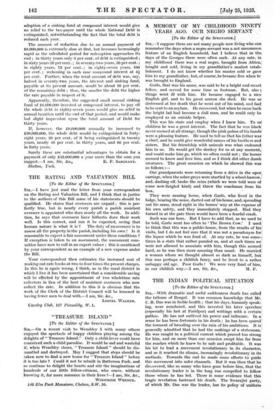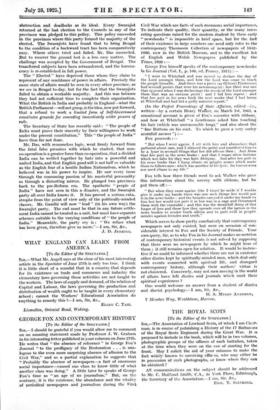THE INDIAN POLITICAL SITUATION
[To the Editor of the SPECTATOR.] SIR,—With dramatic and awful suddenness death has called the tribune of Bengal. It was common knowledge that Mr. C. R. Das was in feeble health ; that his days, humanly speak- ing, were numbered, and this invested his later speeches{ (especially his last at Faridpur) and writings with a certain pathos. He has not outlived his power and influence. In a! sense he has been fortunate in his death ; he has been spared the torment of brooding over the ruin of his ambitions. It is' generally admitted that he had the makings of a statesman. He was caught in a political current which proved too strong for him, and on more than one occasion swept him far from the reaches which he knew to be safe and- profitable. 'It was his lot to lead a movement revolutionary in its character, and as it reached its climax, increasingly revolutionary in its methods. Towards the end he made some efforts 'to guide this movement into safer channels. But it was then That he diseovered, like so many who have gone before- him, that the revolutionary leader is in the long run compelled to follow those whom he has led. There is some evidence that this tragic revelation hastened his death. The Swarajist party, of which Mr. Das was the leader, has its' policy- of uniform
abstraction and deadlocks as its ideal. Every. Swarajist returned at the last election to the Councils in any of the provinces was pledged to this policy. This policy succeeded In the provinces where this party formed the majority of the elected. The Swarajists have found that to bring Bengal to the condition of a backward tract has been comparatively easy. Where others tried and. failed, Mr. Das succeeded. But to recover the ground lost is a less easy matter. The challenge was accepted by the Government of Bengal. The transferred subjects have been retransferred, and the bureau- cracy is re-established in full power.
The_" Elected" have deprived those whom they claim to represent of any semblance of power in affairs. Precisely the same state of affairs would be seen in every other province, as we see in Bengal to-day, but for the fact that the Swarajists failed to obtain a workable majority. And this was because they had not sufficient time to complete their organization. What the British in India and probably in England—what the British Parliament—will not grasp, is the idea, now put forward, that a refusal to work a limited form of Self-Government constitutes grounds for conceding immediately wider powers of rule.
The Secretary of State has recently said : " The people of India must prove their sincerity by their willingness to work under the present constitution." This " the people of India" have thus far not done.
Mr. Das, with remorseless logic, went firmly forward from the fatal false premises with which he started, that non- co-operation is a greater force than co-operation, that a divided India can be welded together by hate into a powerful and united India, and that English good will is not half so valuable as the English fear of a hostile Indian Nationalism, which he believed was in his power to inspire. He saw every issue through the consuming passion of his masterful personality as through a distorting mirror. He plunged two provinces back to the pm-Reform era. The apathetic people of India " have not seen in this a disaster, and the Swarajist party all over India knows it. It has proved a serious cats_ strophe from the point of view only of the politically-minded classes.. Mr. Gandhi will now " lead " (in his own way) the Swarajist party. The end must be thatin an3.- future settle- ment India cannot be treated as a unit, but must have separate schemes suitable to the varying conditions of " the people of India." Meanwhile, the party cry is : " We refuse what has been given, therefore give us more."—I am, Sir, &c.,
J. D. JENKINS.



























































 Previous page
Previous page